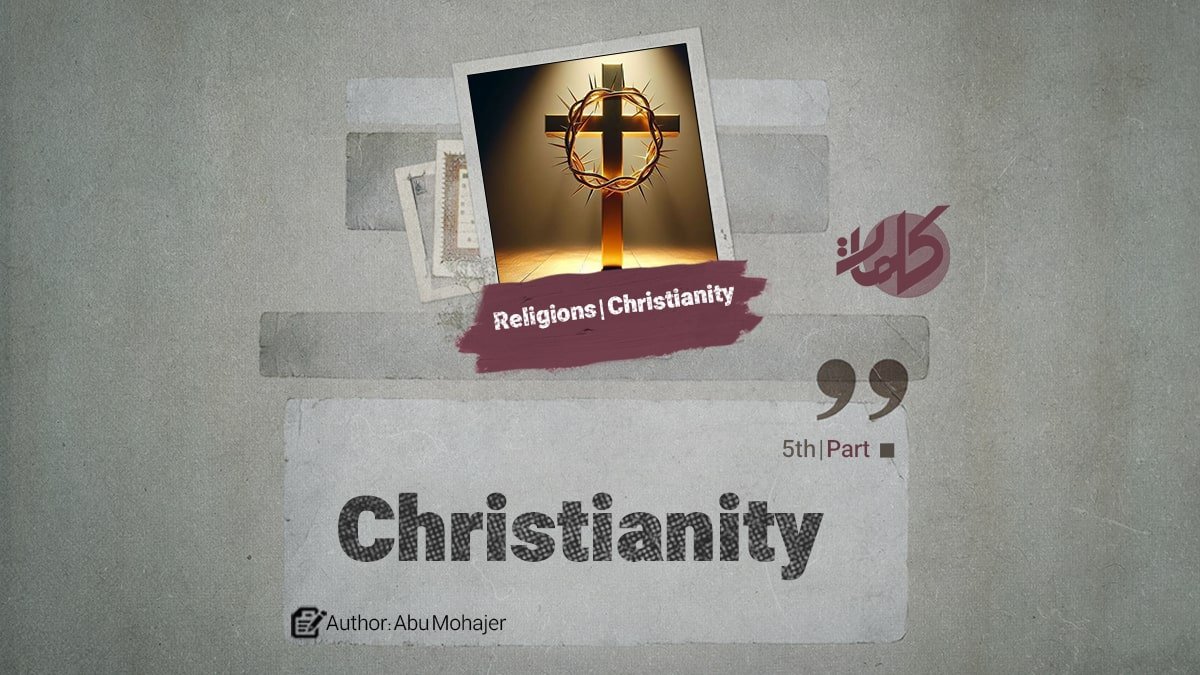Author: Abu Mohajer
Christianity (part 5)
The Church, the Pope, and the religious ceremonies of Christians
Christian religious ceremonies:
Religious ceremonies are one of the most basic religious symbols and values that the followers of every religion adhere to and perform several times a day, once a day, once in a few months, or once in a lifetime. In fact, it is these ceremonies and values that strengthen the relationship between religion and its followers and indicate which religion a person belongs to. Christianity has established contact with the followers and believers of the Christian religion through religious rituals, including the dramatic ceremony of redemption and redeeming sins, more than any other means or intermediary. Sacred religious rituals are customs and rituals that Christians believe were held by the order of Jesus himself.
As mentioned, the number of these sacred rituals has reached seven in the Orthodox and Catholic religions, while the Protestant religion has traditionally accepted only two of them. However, below are some famous instances of these rituals and ceremonies:
1-Baptism ceremony: the most important ritual in Christianity, which is necessary for everyone, is washing or baptism. By baptism, a person enters the Christian community and assumes the permanent mission of the church. This mission consists of testifying to God’s saving works through Jesus. According to every Christian, baptism is a means through which God bestows on a person all the effects of Jesus’ life and death. Baptism is basically done with some kind of washing; In some churches, it is customary to baptize a person by pouring water on his head. At the time of baptism, the priest reads this phrase, which is adapted from the end of the Gospel of Matthew: “I baptize you in the name of the Father, the Son and the Holy Spirit”.
2-Confirmation ceremony: The confirmation ceremony completes the initial ceremony. In other words, the second half of the conduct and progress in the life of every Christian is called “confirmation”. In the first half, i.e. baptism, salvation from sin is emphasized, during which God reconciles with the sinner and calls him to a life based on faith and obedience to God; But in the second half, i.e. “confirmation”, the positive aspect of testifying to what God has accomplished for mankind through Jesus, peace be upon him, and asking for help from the Holy Spirit is emphasized. In fact, the ritual of “confirmation” of a Christian person is considered to be the completion of the baptism ceremony, during this ceremony, everyone reaffirms and reaffirms the covenant and covenant that he made in the baptism ceremony, and in this way, he is part of the congregation and followers.
3-Ritual of repentance and asking for forgiveness: The ceremony of repentance and asking for forgiveness is one of the rituals that does not have a fixed time. The followers of Christianity can hold this ceremony whenever and wherever they want. In other words, the ceremony of baptism and confirmation and execution of a person as a Christian and a member of the church are rituals that are performed only once in a person’s life; But the rite of repentance and asking for forgiveness – which is done in the Roman Catholic Church – can be held at any time and however many times a person wants.
This ceremony is designed to compensate for the sins that have been committed since the time of baptism and is like a ritual during which grace and grace are issued for the forgiveness of specific sins. In this ceremony, four specific actions are performed: repentance, confession of sins, self-satisfaction and announcement of forgiveness of sins by the priest (No’mani, Bita: 29 and Smith, 2007: 442). In this regard, Christians think that priests command and forbid on behalf of God, and they have complete authority in religion, they make halal haram and haram halal, and they forgive the sins of criminals and prepare paradise for them (Al-Qafari Wal-Aql, 1992: 73). God says about the same belief of Christians in Surah Towba: «اتَّخَذُوا أَحْبَارَهُمْ وَرُهْبَانَهُمْ أَرْبَابًا مِّن دُونِ اللَّهِ وَالْمَسِيحَ ابْنَ مَرْيَمَ وَمَا أُمِرُوا إِلَّا لِيَعْبُدُوا إِلَهًا وَاحِدًا لَّا إِلَهَ إِلَّا هُوَ سُبْحَانَهُ عَمَّا يُشْرِكُونَ».
4-The ritual of Lord’s Supper: The meaning of Lord’s Supper is the last supper when Jesus, peace be upon him, sits with his disciples, and then, according to them, he disappears. In other words, this ritual is closely related to the idea of salvation and is considered a symbol of resolution and incarnation, and it commemorates the reenactment of Jesus’ Last Supper with his disciples on the night before his death. According to Christians, Jesus gave the bread and wine as meat to the disciples to eat and drink. When Christians participate in this ceremony, they believe that Christ will appear to them in his body. During the blessing of bread and wine, the leader of the ceremony recites the words of Jesus in the Last Supper; In addition to reading the Bible and eating the sacrifice, chanting and supplication and thanksgiving are performed. Some Christians perform this ritual every day among their family members (No’mani, Bita: 29 and Smith, 2007: 442).



